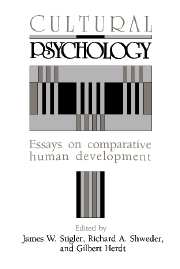Book contents
- Frontmatter
- Contents
- Preface
- Cultural psychology – what is it?
- Part I The keynote address
- Part II Cultural cognition
- Part III Cultural learning
- Part IV Cultural selves
- Part V Cultural conceptions of psychoanalysis
- 13 Stories from Indian psychoanalysis
- 14 The cultural assumptions of psychoanalysis
- 15 Infant environments in psychoanalysis
- Part VI Cultural domination and dominions
- Part VII A skeptical reflection
- List of conference participants
- Name index
- Subject index
14 - The cultural assumptions of psychoanalysis
Published online by Cambridge University Press: 05 June 2012
- Frontmatter
- Contents
- Preface
- Cultural psychology – what is it?
- Part I The keynote address
- Part II Cultural cognition
- Part III Cultural learning
- Part IV Cultural selves
- Part V Cultural conceptions of psychoanalysis
- 13 Stories from Indian psychoanalysis
- 14 The cultural assumptions of psychoanalysis
- 15 Infant environments in psychoanalysis
- Part VI Cultural domination and dominions
- Part VII A skeptical reflection
- List of conference participants
- Name index
- Subject index
Summary
I have decided to use as a point of departure for this discussion a quotation from Freud that clearly indicates that he was aware of the cultural context in which psychoanalysis was born and is practiced. In discussing the cross-cultural insights into psychoanalysis, I consider Freud's ideas first because psychoanalysis is, after all, his brainchild. Surely there is nowadays increasing diversity in psychoanalytic theory and practice, but Freud is “still our lost object, our unreachable genius, whose passing we have never properly mourned,” the “father who doesn't die,” as Dr. Wallerstein aptly put it in his presidential address, “One Psychoanalysis or Many,” at the 1987 International Congress of Psychoanalysis. In plain language, one might just as well say that the ghost of Freud is still uniting the entire body of psychoanalysts, if not hovering over them. Perhaps this is as it should be, but I feel there is something in Dr. Wallerstein's remark that deserves our further consideration, and I shall come back to it at the end of this chapter. At any rate, I discuss psychoanalysis only to the extent that it is still dominated by Freud's original thinking.
Now the quotation from Freud that I want to use is in his essay, “The Future Prospects of Psychoanalytic Therapy.” As its title suggests, the paper has an exuberant tone, promising a substantial improvement in therapeutic prospects of psychoanalysis.
- Type
- Chapter
- Information
- Cultural PsychologyEssays on Comparative Human Development, pp. 446 - 453Publisher: Cambridge University PressPrint publication year: 1990
- 3
- Cited by

